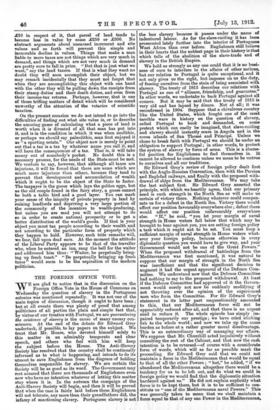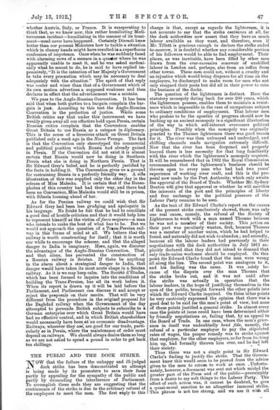THE FOREIGN OFFICE VOTE. -w -E are glad to notice that
in the discussion on the Foreign Office Vote in the House of Commons on Wednesday the question of slavery in the Portuguese colonies was mentioned repeatedly. It was not one of the main topics of discussion, though it ought to have been ; but at all events there was plenty of proof that among politicians of ali parties the plain and simple fact that, by virtue of our treaties with Portugal, we are guaranteeing the existence of slavery is the cause of many uneasy con- sciences. At the end of the debate Sir Edward Grey undertook, if possible, to lay papers on the subject. We trust that Mr. Hoare, who devoted himself solely to this matter in an admirably temperate and clear speech, and others who feel with him will keep the subject before the House. The Anti-Slavery Society has resolved that the country shall be continually informed as to what is happening, and intends to do its utmost to save Englishmen from the disgrace of holding themselves responsible for slavery. We are certain the Society will be as good as its word. The Government may rest assured that there are thousands of Englishmen even now who have no intention whatever of letting this matter stay where it is. In the autumn the campaign of the Anti-Slavery Society will begin, and then it will be proved that when the case is fairly laid before them Englishmen will not tolerate, any more than their grandfathers did, the infamy of sanctioning slavery. Portuguese slavery is not the less slavery because it passes under the name of indentured labour. As for the slave-raiding it has been prosecuted lately further into the interior of Portuguese West Africa than ever before. Englishmen still believe in their hearts that the noblest page in their history is that which tells of the abolition of the slave-trade and of slavery in the British Empire.
We hold as strongly as any one could that it is no busi. ness of ours to interfere in the affairs of other nations, but our relation to Portugal is quite exceptional, and it not only gives us the right, but imposes on us the duty, of freeing ourselves from the stain of being associated with slavery. The treaty of 1815 describes our relations with Portugal as one of " alliance, friendship, and guarantee." In other words, we undertake to back Portugal against all corners. But it may be said that the treaty of 1815 is very old and has lapsed by disuse. Not at all; it was reconfirmed in 1904. Suppose that a chivalrous country like the United States, which fought one of the most terrible wars in history on the question of slavery, called Portugal to book and demanded, on some pretext which can easily be imagined, that slave-raiding and slavery should instantly cease in Angola and in the cocoa islands of San Thome and Principe. Unless we chose to break faith with Portugal we should be under an obligation to support Portugal ; in other words, to protect the system of slavery by force of arms. This is a shame- ful position for Englishmen to find themselves in. It cannot be allowed to continue unless we mean to be untrue to ourselves and all our traditions.
Sir Edward Grey's review of foreign policy dealt first with the Anglo-Russian Convention, then with the Persian and Baghdad railways, and finally with the proposed with- drawal of ships from the Mediterranean. We may take the last subject first. Sir Edward Grey asserted the principle, with which we heartily agree, that our primary need is such strength in the North Sea as will make us certain of victory there. Nothing whatever could compen- sate us for a defeat in the NorteSea. Victory there would affect our position favourably everywhere else ; defeat there would affect our position unfavourably everywhere else. " If," he said, " you let your margin of naval strength in Home waters fall below that which may be brought to bear against you, you are setting foreign policy a task which it ought not to be set. You must keep a. sufficient margin of naval strength in Home waters what- ever your foreign policy, because otherwise in every diplomatic question you would have to give way, and your Government would not be one of the Great Powers." When the proposed withdrawal of battleships from the Mediterranean was first mentioned, it was natural to suppose that our margin of strength in the North Sea was insufficient and that the significant decision to augment it had the urgent approval of the Defence Com- mittee. We understand now that the Defence Committee had nothing to say to the proposed withdrawal. At least if the Defence Committee had approved of it the Govern- ment would surely not now be suddenly modifying if not throwing over the opinion of the experienced men who form the Committee. For Sir Edward Grey's statement in its latter part unquestionably amounted to this, that our Mediterranean force will not be appreciably reduced after all, and that there is no urgent need to reduce it. The whole episode has simply im- paired temporarily our prestige ; we have cried stinking fish to the whole world ; and now we take up the same burden as before at a rather greater moral disadvantage. This is an extraordinary way of managinc, our affairs. We suppose that Mr. Churchill acted impulsively without consulting the rest of the Cabinet, and that now the rash intention is to be reversed—of course with a considerate form of words, which will as far as possible mask- the proceeding. Sir Edward Grey said that we could not maintain a force in the Mediterranean that would be equal to that of all the other Powers ; " but," he added, " if we abandoned the Mediterranean altogether there would be a. tendency for us to be left out, and do what we could in foreign policy we would find that the diplomatic situation hardened against us." He did not explain explicitly what force is to be kept there, but it is to be sufficient to con- stitute us " one of the Mediterranean naval Powers." This was generally taken to mean that we -shall maintain a force equal to that of any one Power in the Mediterranean, whether Austria, Italy, or France. It is exasperating to think that, as we know now, this rather humiliating Medi- ' terranean incident—humiliating in the manner of its treat- ment—need never have happened. Certainly Disraeli knew better than our present Ministers how to tackle a situation which in clumsy hands might have resulted in a superfluous confession of impotence. Once when he was suddenly faced with alarming news of a menace in a quaver where he was apparently unable to meet it, and he was asked sardoni- cally what he meant to do, he is said to have replied im- pressively, "It is the intention of her Majesty's Government to take every precaution which may be necessary to deal adequately with the- situation." The spirit of that reply was cooler and wiser than that of a Government which of its own motion advertises a supposed weakness and then declares in effect that the advertisement was a mistake.
We pass to the Anglo-Russian Convention. It has been said that when both parties to a bargain complain the bar- gain is just. According to this test the Anglo-Russian ' Convention is the perfection of justice. While some British critics say that under this instrument we have weakly given away all our effective hold upon Persia, certain • Russian critics complain that the Convention enables Great Britain to use Russia as a catspaw in. diplomacy. • This is the sense of a feroeious attack on Great Britain published only a week ago in the Novoe Vremya. The fact is that the Convention only stereotyped the commercial and political- position which Russia had already gained in Persia. If the Convention did not exist it is almost certain that Russia, would now be doing in Southern Persia what she is doing in. Northern Persia. That is Sir Edward Grey's belief, and he is perfectly justified by the facts in holding it. The Convention gives us a, ground for restraining Russia in a perfectly friendly way. A side illustration of this was supplied only the other day in the release of Miss Malecka. It is certain that if the Russo- phobes of this country had had their way, and there had been no Convention, Miss Malecka would still be in prison, with Siberia looming ahead of her. • As for the Persian railway we could wish that Sir Edward Grey had been less grudging and apologetic in his language. No aoubt he felt that he had to conciliate a good deal of-hostile criticism and that it would help him to represent himself as the victim of orce majeure—a man who intends to make the best of what has to be. But we would not approach the question of a Trains-Persian rail- way in this frame of mind at all. We believe that the railway is worth constructing for itself ; that it is worth our while to encourage the scheme, and that the alleged danger to India is imaginary. Here, again, we discover the advantages' of the Anglo-Russian Convention. That, and that alone, has preirented the construction of a Russian railway- in Seistan. If there be anything in the alarm about a strategical danger to India, that danger would have taken its most acute shape in a Seistan railway. As it is we may keep calm. The Societe d'ntudes, which has been formed to inquire, into the conditions of building the Trans-Persian, has -all its work before it. When its report is drawn up it will be laid. before' the Parliament, and Parliament can discuss it and accept or reject the -proposals on their merits. That will be very different' from the procedure in. the original proposal for the Baghdad railway when the Government -of the day attempted to Persuade British subjects to subscribe to German enterprise over which Great Britain would have had no effeetivecontroI, and in which British shareholders would necessarily have been:aean economic disadvantage. Railways, wherever they aae, are good for our trade, parti- cularly so in Persia, where the maintenance of order must depend'on railways. We should always desire them so long as we are not asked to spend a pound in order to get back- ten shillings.







































 Previous page
Previous page